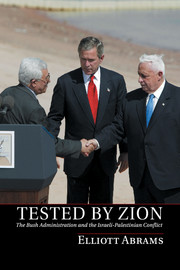Book contents
- Frontmatter
- Contents
- Acknowledgments
- Introduction
- 1 Early Days
- 2 9/11 and the Search for a Policy
- 3 Roadmap to Disengagement
- 4 “New Realities on the Ground”
- 5 Arafat, Disengagement, Sharon
- 6 Olmert – Peace or War?
- 7 War in Lebanon – and Condi
- 8 From Mecca to Annapolis
- 9 The “Meeting” at Annapolis
- 10 Two Trips to Jerusalem
- 11 Final Days in Gaza and Turtle Bay
- 12 Lessons Learned
- 13 Conclusion
- Index
- References
4 - “New Realities on the Ground”
Published online by Cambridge University Press: 05 January 2013
- Frontmatter
- Contents
- Acknowledgments
- Introduction
- 1 Early Days
- 2 9/11 and the Search for a Policy
- 3 Roadmap to Disengagement
- 4 “New Realities on the Ground”
- 5 Arafat, Disengagement, Sharon
- 6 Olmert – Peace or War?
- 7 War in Lebanon – and Condi
- 8 From Mecca to Annapolis
- 9 The “Meeting” at Annapolis
- 10 Two Trips to Jerusalem
- 11 Final Days in Gaza and Turtle Bay
- 12 Lessons Learned
- 13 Conclusion
- Index
- References
Summary
If Ariel Sharon had been vague in his Herzliya speech of December 2003, he did not wait long to spell out his intentions to Israelis and to the world. On February 2, 2004, he told an interviewer from the Israeli newspaper Haaretz that he would remove all 17 settlements and every Israeli (there were roughly 7,500) from Gaza. “It is my intention to carry out an evacuation – sorry, a relocation – of settlements that cause us problems and of places that we will not hold onto anyway in a final settlement, like the Gaza settlements,” Sharon said, though he gave no timetable. “I am working on the assumption that in the future there will be no Jews in Gaza.”
Sharon met with Likud members of the Knesset in the days after his Haaretz interview, and reactions from many on Israel's right were loud: Sharon was abandoning a lifetime of commitment to settlements, was betraying his party, and was rewarding terror. A few weeks before the interview, on January 12, 2004, the Settlers’ Council had organized an anti-disengagement mass rally in Tel Aviv that attracted 120,000 people. In the days and weeks after the interview, Gaza settlers picketed at Sharon's ranch in the Negev, angrily denouncing him. A council of rabbis declared a day of fasting to “annul the evil decree.” The National Religious Party said it would pull out of the government coalition if he moved forward, though Sharon's majority of 73 in the 120-seat Knesset gave him a cushion against such threats from outside Likud; his real problem would prove to be the party itself, where opposition was quickly building: “The turmoil in the Likud turned into an uprising,” according to a biography of Sharon. A criticism repeated often by the Israeli media was that Sharon was trying to distract the public's attention from a serious police investigation of the funding of his most recent campaign. There had already been one indictment, and it was unclear whether the scandal would touch Sharon himself. One Knesset member from the National Union Party, himself a settler, told reporters that “the prime minister's sole motivation now is the police investigations. The progress of the investigation will determine the extent of uprooting” of settlers and settlements in Gaza; “the more investigations, the more evacuations.”
- Type
- Chapter
- Information
- Tested by ZionThe Bush Administration and the Israeli-Palestinian Conflict, pp. 98 - 118Publisher: Cambridge University PressPrint publication year: 2013



